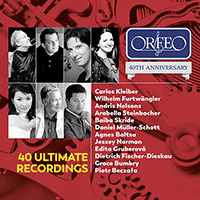Carlo Bergonzi
Carlo Bergonzi was born into a family of opera lovers: he was only six years old when his parents took him to a performance of Il trovatore, which made an immediate impression. While still young he sang in choirs and appeared in child rôles in opera performances in Busseto, Verdi’s birthplace. After attending elementary school he worked for his father, making Parmesan cheese, but at the age of fourteen he entered the Parma Conservatory, where he studied piano for five years. Although in 1943 he was interned by the Nazi regime for antifascist activities, when World War II ended he returned to the Parma Conservatory to study as a baritone with Ettore Campogalliani.
It was as a baritone that Bergonzi made his début, as Figaro/Il barbiere di Siviglia in 1948 at Lecce. Other baritone rôles included Belcore/L’elisir d’amore and Marcello/La Bohème (both with Gigli, as well as a tour of L’elisir d’amore with Tito Schipa, all formative experiences); Dr Malatesta/Don Pasquale, Germont/La traviata, Enrico/Lucia di Lammermoor, and a single performance as Rigoletto, substituting for Tito Gobbi in Puglia. Bergonzi has said (in conversation with Stefan Zucker) that it was this performance that made him realise he was not a baritone, commenting: ‘I didn’t succeed in finding the power, also the velvet voice for the pathetic moments, that the part demands.’ His wife too suggested he was a tenor after hearing him sing a perfect high C in his dressing room one evening.
Bergonzi made his début as a tenor, self-taught, in the title rôle in a performance of Andrea Chénier at the Teatro Petruzelli in Bari on 12 January 1951, the date of the birth of his first son. Within a few months he had fully accomplished the transition to tenor, and was participating in several of the radio productions mounted by RAI to mark the centenary of Verdi’s birth, most notably singing Aroldo/I due Foscari, conducted by Giulini, as well as Carlo/Giovanna d’Arco and Gabriele/Simon Boccanegra. These performances were heard by agents and impresarios as well as by the general public and offers of singing engagements in Italy soon followed.
The title rôle of Jacopo Napoli’s Masaniello brought Bergonzi’s La Scala, Milan début in 1953. He continued to appear there regularly for twenty years, giving his farewell performance in 1993. His British début also came in 1953 with Don Alvaro/La forza del destino at the Stoll Theatre, London, the same rôle in which he made his first Covent Garden appearance in 1963. As with La Scala, Bergonzi returned to Covent Garden on many occasions, giving his farewell recital there in 1992. He made his American début in 1955 in Chicago, singing Luigi/Il tabarrro and Turiddù/Cavalleria rusticana in a double bill. This was followed by his Metropolitan Opera début the following year, as Radamès/Aida: in all Bergonzi sang twenty-one rôles at this opera house, encompassing most of the major tenor repertoire, in 249 performances, making his last stage appearance there in 1988 as Edgardo/Lucia di Lammermoor. Between 1958 and 1978 he sang regularly at the Verona Arena as well as throughout Italy, and also apeared at most of the major international opera houses including those in Barcelona, Berlin, Buenos Aires, Madrid, Rome, San Francisco, Vienna and Tokyo.
During the 1980s Bergonzi gradually moved from operatic rôles to recitals. Although he withdrew from singing in public in 1994, in 2000 his participation in a concert staging of Otello in New York was announced: he was however unable to complete the performance. After retiring to live in Busseto, Bergonzi was active as a teacher. Several of his pupils, for example Giuliano Ciannella, Vincenzo La Scola and Salvatore Licitra, have achieved international distinction. He also initiated the Voci Verdiane Competition which is held at Busseto.
Bergonzi’s performances (like those of his contemporaries Franco Corelli, Giuseppe di Stefano and Mario del Monaco, all of whom he outlasted), stood out for the warmth of his voice, the musicality of his singing and the drama of his delivery. His stage presence could be slightly wooden, but the beauty, elegance and good taste of his singing more than made up for any deficiency in this department. His discography is large, being made up of many outstanding commercial studio recordings and numerous unofficial recordings of live performances. He was distinguished as an intepreter of the operas of Verdi.
© Naxos Rights International Ltd. — David Patmore (A–Z of Singers, Naxos 8.558097-100).























